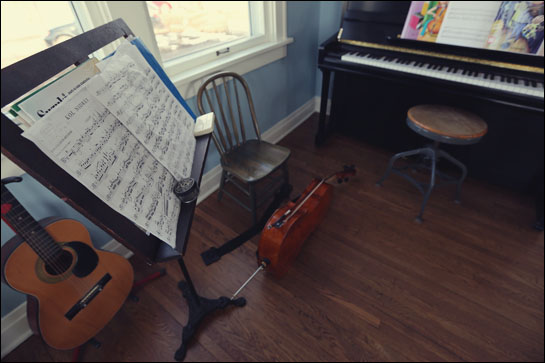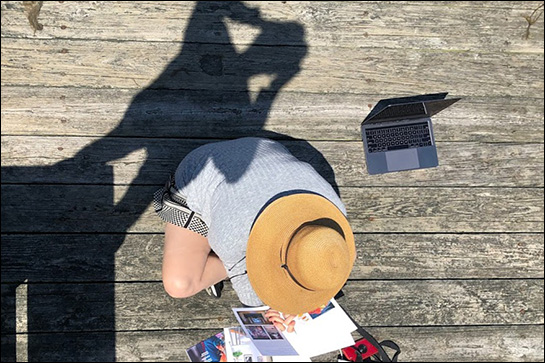Well-rounded is the opposite of working hard at something you love

Parents stress about their kids studying all the right stuff until parents see a different path for their kids. We don’t realize that we think of well-roundedness as a way to hedge having failed to help our kids find what excites them.
Stop asking yourself asking how will my kid learn xxx?
Is your kid great at languages? Once your kid speaks five languages, no one asks you how the kid is going to learn algebra. The kids at the NYC Professional Children’s school are excused from classes for long-term Broadway runs, short term international music competitions, and anything, really, that might compromise their established gift in the arts.
I met dozens of musical kids I met who took perfunctory online courses while they were practicing eight hours a day. No one asks if the school is good. They just say, “What do you do about school?” Like it’s something to get through. This makes sense since we know the mind of a prodigy is almost always lopsided. If your brain is optimized for one thing, then it’d de-optimized for something else.
Ask yourself what is my kid great at?
Scientific American describes the phenomena where the kids who score well on IQ tests are usually not the prodigies. While not all autistic kids are prodigies, all prodigies are probably autistic. They have a rage to learn that translates to practice, and they have incredible attention to detail so that the practice is effective.
I wish I had learned a little earlier that there is no point in making a prodigy well-rounded. First of all, it’s impossible, because by definition the prodigy knows one thing better than all others: not round. But also, it’s a waste of the kid’s time, because a prodigy is for fields where there is a sequence of things to learn and people measure speed and process to determine who deserves the best coaching.
Teach your kid to tolerate the risks of working very hard.
So then well-rounded is for the land of the non-prodigy. But I wonder, why not look at every kid as very gifted. Maybe not all are prodigies because you can only become a prodigy if you are working in a field with sequential, defined learning that you can conquer by age 10. But every kid has one thing they are better at than other people. Autistic kids practice harder and longer than other kids because autism promotes singular interests. But neurotypical kids can excel in areas where autistic kids don’t stand a chance — social arenas, emotional arenas, the parts of life that are unpredictable.
Everyone can be great at something, but you can only be great at something you work hard at. So the focus of curricula should be hard work at something that comes relatively easy to you. Well rounded education does not require hard work because you don’t have to be great or stand out for anything. Being not well rounded requires spending a lot of time on a single thing. If you work hard during that time, that’s an education.
The result: you can worry a lot less
If you find yourself worrying all the time about how is your kid going to learn everything — whatever you define as everything — that’s a sign that you should really be asking yourself how is your kid going to learn what they are great at. What makes them so excited that they practice doing it more than other people practice? That’s how a kid learns to work hard at something that matters to them. And in my mind that’s the most intoxicating thing about prodigy: hard work and commitment coming from a kid when most adults never learned how to do it.



Penelope, I LOVE your refreshing true perspective which is brave enough to talk back to the fear culture of conformity we’re living in. Thanks as always for an inspiring message to empower us to honor who our children really are and what their greatest contributions will be.
HI PT. It’s nice to see you posting here again. I hope you can make a go of this blog again, because it was fun when it was active.
It’s interesting to think back on how much you’ve written about prodigy and single-mindedness as virtues. The above post is very similar to things you wrote a decade ago, before your sons were college and high-school age. I guess reiteration of it now means you believe that theory has worked out well in your practice. That’s good to hear; your older son must enjoying college, then. History, was it?
I don’t share your enthusiasm for the prodigy, who I worry may end up stuck in something unfulfilling and unprofitable because of a lack of development in other areas, reducing his ability to choose. What was that article again? Right, A.A, Gill, back in 2012, in Vanity Fair:
“My advice to any child reading this: If you’re particularly good at the violin or math, for God’s sake don’t let anyone find out. Particularly your parents. If they know you’re good at stuff they’ll force you to do it forever. You’ll wake up and find yourself in a sweaty dinner jacket and clip-on bow tie playing “The Music of the Night” for the ten-thousandth time in an orchestra pit. Or you’ll be the fat, 40-ish accountant doing taxes for the people who spent their school days copping a feel and learning how to roll a good joint.”
I got a kick out of that article. And my children, wisely, hid any prodigy from me, and gained flexibility thereby. My son, who is diagnosed autistic, has great talent in math, music, languages, and who knows what else, because he wisely doesn’t share everything with us. He told me recently that he was glad I never became some sort of stage parent, never got too personally invested in his pursuits. So when he wanted to quit the advanced math he was studying at 16 and go back to music at a different college he was able to do that, and it seems to have been the right choice. He couldn’t have gone to college at 16 in the first place if he wasn’t well-rounded enough to be competent in all the required courses.
Along the way, he’s had lots of liberal arts classes, pedagogy classes, writing classes, science classes, etc., and they’ve all been good for him because exposure to all of these tracks and ideas has helped him discover his own options, and make his own choices, instead of remaining in whatever specialization he was in at ten, or worse, believing what his parents tell him his choices are. That seems like one of the dangers of early specialization to me – not the question of whether a kid can learn algebra, because any kid who wants to can learn algebra – but the bubble that forms around a prodigy, insulating him from other opportunities. How will the early specialist find out there’s something he’d rather do? And will the sunk costs prevent him from doing it?
I’m enjoying meeting my son’s friends from college. One nice young fellow studied biochemistry the first time he went through college, and even worked in a lab briefly before he decided he wanted to go back to college for music; his talent on piano is engrossing. I find no reason to believe that if he’d only studied piano before now he’d play better; I suspect the opposite.
My daughter, who is now 11, displays a talent at visual art that I find stunning. And the last thing I would ever do now is push her into art classes, or exhibits, or anything of the sort. It’s up to her to discover her opportunities and venues. She continues to go to school, where she studies things she enjoys more and things she enjoys less. If she ends up going to college for art someday, it won’t be because that’s all she knows how to do.
I am excited to hear updates from people. I think I had to take a break to get my bearings again. It’s hard to homeschool in public. But I do it in public because it’s so fun to do it as a group. I love hearing peoples’ lives unfold over time. Thank you,
Totally agree with you on this one. I have one daughter who’s been playing on computers since she was 18 months old and she just got a very prestigious college internship for this summer in IT. I have another daughter who started horse back riding at about 6 years old and will be studying animal science in college next year. Both of them just gravitated to their specialty and while I always indulged them when they wanted to try something new, I let them stop when it wasn’t for them. Passion will take you a long way.
Another fun update from a long-time reader. Thanks. And it’s great to hear your daughters are doing stuff that makes them happy.
Penelope